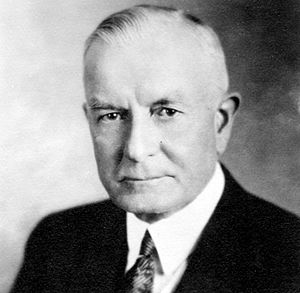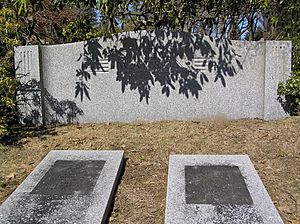Thomas J. Watson facts for kids
Quick facts for kids
Thomas J. Watson
|
|
|---|---|
 |
|
| Born |
Thomas John Watson
February 17, 1874 Campbell, New York, U.S.
|
| Died | June 19, 1956 (aged 82) Manhattan, New York City, U.S.
|
| Occupation | Chairman and CEO of IBM 1914–1956 |
| Spouse(s) |
Jeanette M. Kittredge
(m. 1913) |
| Children | 4, including Thomas Watson Jr. and Arthur K. Watson |
Thomas John Watson Sr. (born February 17, 1874 – died June 19, 1956) was an important American businessman. He was the boss, known as chairman and CEO, of IBM. He helped IBM grow into a huge international company from 1914 to 1956.
Watson learned a lot about managing a business from John Henry Patterson at NCR. He made IBM a very strong sales company. They mostly sold punched card tabulating machines. Watson was a self-made success and one of the richest people of his time. Many called him the world's greatest salesman when he passed away.
Contents
Early Life and First Jobs
Thomas J. Watson was born in Campbell, New York. He was the fifth child and only son of Thomas and Jane Fulton White Watson. His family lived on a farm, and his father also owned a small lumber business. This was near Painted Post and Corning, New York.
Young Thomas worked on the family farm. He went to District School Number Five in the late 1870s. Later, as a teenager, he attended Addison Academy in Addison, New York.
After teaching for only one day, Watson decided to study accounting and business. He took a year-long course at the Miller School of Commerce in Elmira, New York. In 1891, he got a job as a bookkeeper for a market in Painted Post.
A year later, he became a traveling salesman. He sold organs and pianos for a local hardware store. This was Watson's first sales job. He earned $10 a week. After two years, he realized he could earn much more if he worked on commission. This made him quit and move to Buffalo.
In Buffalo, Watson tried selling sewing machines for a short time. He then worked for a man selling shares in a loan company. This man was dishonest and ran off with the money. Next, Watson opened a butcher shop in Buffalo. It failed quickly, leaving him with no money or job.
Working at NCR
Watson had a NCR cash register in his butcher shop. When the shop failed, he went to NCR to arrange payments for it. There, he met John J. Range and asked for a job. Watson kept asking until he was finally hired in November 1896. He started as a sales apprentice.
NCR, led by John Patterson, was a top sales company. John J. Range, the Buffalo manager, became a mentor to Watson. Watson later said he learned the most from Range. At first, Watson was not a good salesman. But with Range's help, he became the most successful salesman in the East. He earned $100 a week.
Four years later, NCR put Watson in charge of their struggling office in Rochester, New York. He earned a 35% commission. Watson made Rochester an NCR stronghold in four years. He even used tough tactics against competitors. As a reward, he was called to NCR's main office in Dayton, Ohio.
In 1912, NCR was found guilty of breaking the Sherman Antitrust Act, a law against monopolies. Patterson, Watson, and 26 other NCR leaders were convicted. They were sentenced to one year in prison for unfair business practices. Many people supported them because of their help during the Dayton floods of 1913. But their requests for a pardon were denied. However, their convictions were overturned in 1915. This happened because important defense evidence was not allowed in the first trial.
Leading IBM's Growth
Charles Ranlett Flint had brought together several companies to form the Computing-Tabulating-Recording Company (CTR). He found it hard to manage these five companies. So, he hired Watson as general manager on May 1, 1914. At that time, CTR had about 1,300 employees.
Eleven months later, Watson became President of CTR. This happened after his court cases from his time at NCR were settled. Within four years, the company's income had doubled to $9 million. In 1924, Watson changed CTR's name to International Business Machines, or IBM.
Watson built IBM into a very powerful company. By 1952, the government filed a lawsuit against IBM. They said IBM controlled too much of the market. IBM owned and rented out over 90 percent of all tabulating machines in the U.S. When Watson died in 1956, IBM's income was $897 million. The company had 72,500 employees.
Throughout his life, Watson cared deeply about international relations. He was known as an unofficial ambassador for U.S. President Franklin D. Roosevelt in New York. He often hosted leaders from other countries. In 1937, he became president of the International Chamber of Commerce (ICC). At a meeting in Berlin that year, he said the main idea would be "World Peace Through World Trade." This phrase became a motto for both the ICC and IBM.
IBM and World War II
In 1937, Watson met Adolf Hitler as president of the International Chamber of Commerce. During the 1930s, IBM's German branch was its most profitable foreign business. A book called IBM and the Holocaust suggests Watson approved IBM's technology relationship with Nazi Germany. It describes how IBM provided machines used to count people, including Jews. These machines used "Hollerith punch-cards," which were cards with holes. Each hole represented a different piece of information about a person. These cards helped identify Jews by name.
Critics point to the Order of the German Eagle medal Watson received in Berlin in 1937. They say it was for the help IBM's German branch, Dehomag, gave the Nazi government. This help included counting people for census data. Another view is that Watson might have thought the medal was for his work promoting global trade and peace.
Watson wanted to return the medal soon after getting it. The U.S. Secretary of State advised him not to. But in June 1940, Watson sent the medal back. Dehomag's leaders did not like this. They thought about separating from IBM. This happened when Germany declared war on the United States in December 1941. German shareholders took control of Dehomag.
However, during World War II, IBM branches in Europe still sent punch cards to Dehomag. Documents show that IBM leaders in New York worked hard to keep control over Dehomag. They did this through managers in neutral Switzerland.
During this same time, IBM helped the U.S. war effort. They made a lot of data processing equipment for the military. Watson Sr. also created the "1% doctrine" for war profits. This meant IBM would only make a 1% profit from selling military equipment to the U.S. government. Watson was one of the few CEOs to have such a policy.
Watson cared personally about the war. His oldest son, Thomas J. Watson Jr., became a bomber pilot. He later became a personal pilot for General Follet Bradley. His youngest son, Arthur K. Watson, also joined the military.
After World War II
After World War II, Watson helped create a college near Binghamton. This is where IBM was founded and had major factories. In 1946, IBM gave land and money for Triple Cities College. This college later became Harpur College, and then Binghamton University. The engineering school there is named the Thomas J. Watson College of Engineering and Applied Science.
After the war, Watson worked to expand IBM's reach around the world. In 1949, he created the IBM World Trade Corporation. This company managed all of IBM's business outside the U.S.
Watson retired in 1956. His oldest son, Thomas J. Watson Jr., took over as IBM's CEO. Thomas J. Watson Sr. died on June 19, 1956, in Manhattan, New York City. He was buried in Sleepy Hollow Cemetery in Sleepy Hollow, New York.
Personal Life and Family
Watson married Jeanette Kittredge on April 17, 1913. She came from a well-known railroad family in Dayton, Ohio. They had two sons and two daughters:
- Thomas Watson, Jr. followed his father as IBM chairman. He later served as ambassador to the Soviet Union.
- Jeanette Watson Irwin married businessman John N. Irwin II. He later became ambassador to France.
- Helen Watson Buckner became an important helper of charities in New York City.
- Arthur K. Watson was president of IBM World Trade Corporation. He also later served as ambassador to France.
Watson was a strong supporter of President Roosevelt. He was one of the most famous businessmen in the Democratic Party. Many saw him as Roosevelt's biggest supporter in the business world.
Watson was a powerful trustee of Columbia University from 1933 until his death. He helped choose Dwight D. Eisenhower to be its president. He also played a key role in convincing Eisenhower to take the job. He was also a trustee of Lafayette College. A residence hall there, Watson Hall, is named after him.
In 1937, Watson received the Order of the German Eagle medal from Adolf Hitler. This happened while he was president of the International Chamber of Commerce at a meeting in Germany.
In the 1940s, Watson was on the national board of the Boy Scouts of America. He also served as an international Scout commissioner. He received the Silver Buffalo Award in 1944. His son, Thomas Jr., later became the national president of the Boy Scouts.
Watson continued to own and enjoy the family farm where he was born. In 1955, he and his wife gave the farm and one million dollars to the Methodist Church. It became a retreat and conference center called Watson Homestead. The one-room school Watson attended as a child is still there.
Famous Motto: THINK
"THINK" – Watson started using this word to inspire his staff at NCR. He continued to use it at CTR (which became IBM). IBM's first U.S. trademark was for the name "THINK" in 1935. This was 14 years before they trademarked "IBM."
A 1940 article noted that "THINK" was on the most visible wall in every IBM building. Employees carried "THINK" notebooks. The company's stationery and other items also had "THINK" on them. A monthly magazine called 'Think' was given to employees. "THINK" is still a part of IBM's culture today. It inspired the name for IBM's successful notebook computers, the IBM ThinkPad. In 2007, a credit union linked to IBM changed its name to Think Mutual Bank.
See also
 In Spanish: Thomas John Watson para niños
In Spanish: Thomas John Watson para niños
- IBM and the Holocaust
- IBM during World War II
- Jeannette K. Watson Fellowship
- Thomas J. Watson Fellowship
- Thomas J. Watson Research Center
- Thomas J. Watson College of Engineering and Applied Science
- Watson (computer), named in honor of Thomas J. Watson
 | Sharif Bey |
 | Hale Woodruff |
 | Richmond Barthé |
 | Purvis Young |


